- Author Jason Gerald gerald@how-what-advice.com.
- Public 2023-12-16 10:50.
- Last modified 2025-01-23 12:04.
A food allergy is the immune system's defense response to a specific protein in your food. Food allergies are actually relatively rare and affect about 6-8% of children and 3% of adults. Symptoms vary from mild to life-threatening. However, by avoiding trigger foods and taking care of your general health, you can better manage food allergies.
Step
Part 1 of 2: Avoiding Allergy Trigger Foods
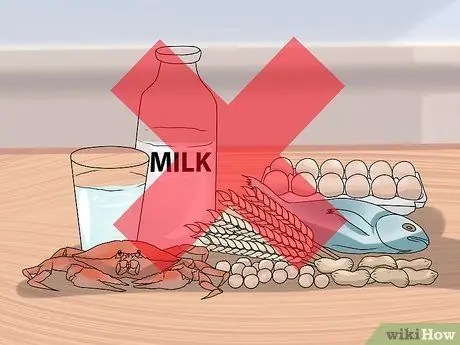
Step 1. Keep allergenic foods out of the kitchen
Allergies you experience are caused by certain foods. So, keep all products containing these foods from your home. This step can minimize your risk of consuming foods that cause allergic reactions. Foods that most often trigger allergies include:
- Egg
- Milk
- Peanuts and tree nuts such as walnuts
- Wheat
- Soya bean
- Shellfish
- Fish
- Get rid of foods whose ingredients you don't clearly know. Food Allergy Research & Education (FARE) provides a complete list of foods with ingredients that often trigger allergies.
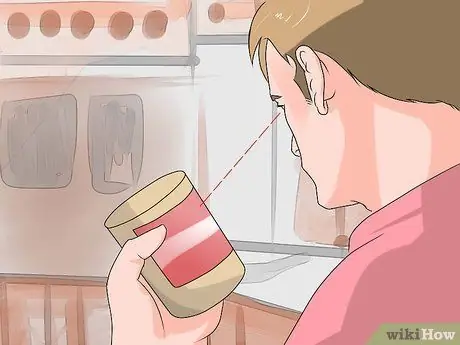
Step 2. Read food labels whenever possible
There are many allergy triggers contained in everyday foods and even vitamins. So you have to find out what products can cause an allergic reaction. Read food and product labels to see if they contain allergens. For information, law in the US requires food manufacturers to list the 8 food ingredients that most often trigger allergies in common terms on the packaging. In addition, you may need to identify the common code names of allergens, such as:
- Casein, lactalbumin, lactose, rennet casein, whey, and tagatose for milk
- Flour, einkorn, seitan, triticale, vital wheat gluten, or durum for wheat
- Albumin, globulin, livetin, lysozyme, surimi, and vitellin for eggs
- Edamame, miso, natto, shoyu, tamari, tempeh, tofu for soybeans
- Glucosamine or surimi for shellfish
- Pea protein hydrolyzate for peanuts
- Fish gelatin, nuoc mam, roe, sashimi, surimi for fish.
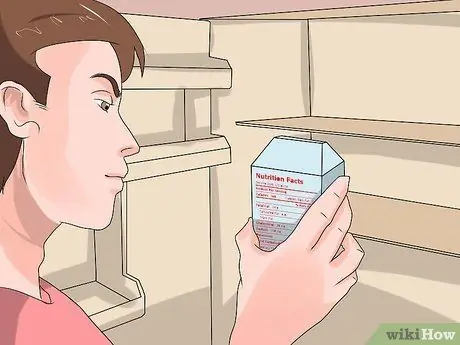
Step 3. Store allergen-free foods in a variety of options in the kitchen
Even though you have to keep a lot of your favorite foods out of the kitchen because of allergies, you can instead keep other foods that don't contain allergens in the kitchen. Storing allergen-free foods in a variety of options can minimize your risk of cooking food that could cause an allergic reaction.
- If you live with other people who can eat allergenic foods, it's best to keep the two types of food separate to reduce the risk of contamination. Keep in mind that cross-contamination is possible. So, you should make sure there are no allergenic foods around your food storage area.
- Ask the store clerk if there are special foods for allergy sufferers sold there. Today, there are several stores that provide special racks of grain-free foods, for example.
- Use other foods to replace allergy triggers. For example, you can use: oat milk or rice milk instead of dairy products, rice flour or corn products to treat a wheat allergy, xanthan gum instead of eggs, pumpkin seeds or roasted sunflower seeds instead of peanuts or tree nuts.
- Remember to always read the labels on food packaging and make sure the allergens or code names aren't usually listed there. Avoid all unlabeled foods or products.
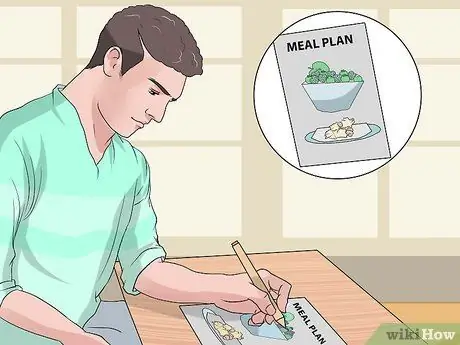
Step 4. Create a food menu schedule
Cooking yourself is a safe way to minimize your risk of consuming allergenic foods. Making a meal schedule may not only prevent allergic reactions, but also ensure that your body is getting enough vitamins and nutrients to stay healthy.
- Make a food menu schedule once a week. Pay more attention to foods you don't eat at home, such as lunch. Prepare lunch or other meals if you like. If you're planning to eat at a restaurant, check the menu beforehand to find out what's safe for you to eat.
- If your food allergy is severe, you may need to pay special attention to make sure there are no allergens in and near your food. For some people, just being close to the trigger material can cause allergies.

Step 5. Set up a meal plan at the restaurant
Food allergies can make it difficult for you to eat at restaurants. Many restaurants use products that contain allergens, or cook them in the same place as the allergens. Call the restaurant ahead of time, and ask about the menu and how they cook it to minimize the risk of an allergic reaction.
- Ask the restaurant manager, waiter or chef if they can accommodate your allergies. You may need to explain the trigger.
- Ask if restaurant staff are trained on food allergies, if food for allergy sufferers is cooked separately on separate utensils, or if they provide special products for allergy sufferers.
- Be prepared if the restaurant does not provide your first choice.
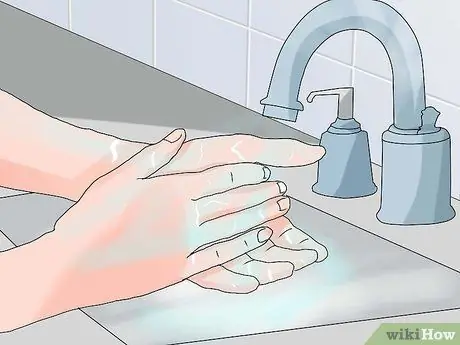
Step 6. Minimize cross-contamination
You may be exposed to food allergens accidentally as a result of cross-contamination. So, pay close attention to the foods you buy, how they are stored, and how you cook them to prevent allergic reactions.
- Use different cooking utensils and places to prevent cross-contamination at home.
- Consider purchasing specialized cookware such as a toaster or blender yourself.
- Wash your hands with soap and water before cooking to remove contaminants.
Part 2 of 2: Coping With Food Allergies
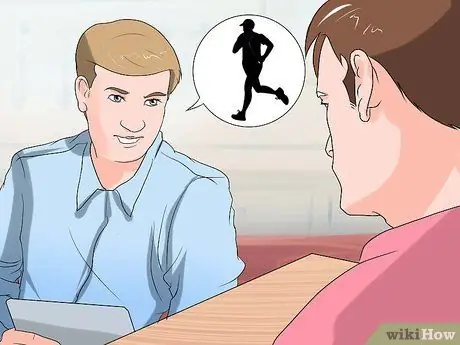
Step 1. Seek medical help
Make an appointment with your doctor if your allergies or allergy symptoms get worse, or if you're having trouble coping. Your doctor will do an examination, discuss how to treat allergies with you, or refer you to a psychiatrist who can help.
- Your doctor may also recommend that you undergo further allergy testing, which may include blood or skin tests, an elimination diet, keeping a food journal, or a food provocation elimination test to determine the cause of your illness.
- The doctor may also check for other things related to food allergies such as anxiety, depression, or exercise.
- Ask your doctor if there are medications that can help you. Be sure to use medications that are prescribed or recommended by your doctor.
- The best treatment for allergies is to avoid the trigger if possible. If you can't avoid these foods, make sure you have preparations in place for exposure. Depending on the severity of the allergic reaction, you may even have to carry an epinephrine shot with you at all times if you are at risk for an anaphylactic reaction from an allergy.
- Consider seeing a counselor if you're having trouble coping with food allergies.

Step 2. Consult a nutritionist
Ask your doctor to refer you to a dietitian if you have trouble adjusting your diet. A nutritionist can help you identify allergy triggers, identify and prepare other nutritious foods, as well as develop a menu of foods that can improve your health.
- Find a dietitian or professional health practitioner who specializes in food allergies. From them, you can get information on safe food choices, hidden allergy triggers, as well as find out alternative meals when eating out.
- If you can't find a nutritionist or health practitioner specializing in food allergies, try using Konsula to find a clinical nutritionist in your local area.
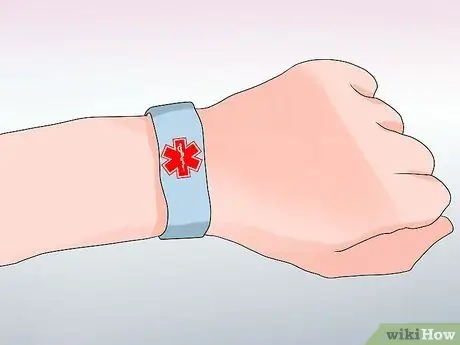
Step 3. Tell others about your allergies
Telling other people about your food allergies can be an important part of dealing with it. You can prevent uncomfortable situations or questions by sharing these conditions openly. In addition, other people will also recognize your allergy attack if it occurs.
- Tell your friends, family, co-workers, people who care for you, as well as other important people who know about your allergies. That way, in an emergency they can help you.
- Wear a medical necklace or bracelet that contains information on how to help you in an emergency.

Step 4. Ignore social stigma and pressure
Most people should be able to understand your food allergies and needs. Social pressure or stigma from others is usually caused by misinformation. Learning to ignore these negative reactions can help you live an active and happy life.
- You may feel embarrassed when you have to ask for special food or dishes when eating out. Explain your condition, and ignore other people's reactions. Ignoring negative reactions can help you deal with allergies.
- Positive affirmations can help you be more confident and able to manage your health while preventing the side effects of allergies. Repeat this phrase, "What other people think is not important." These affirmations can reduce your shame or guilt.
- Change the way you perceive negative perceived energy by taking deep breaths, repeating positive affirmations, and thinking about something positive like being on top of a beautiful mountain.
- Love and accept yourself. For example, say "I may have a food allergy, but this allergy can't control me. I can still have dinner out and spend time with friends."
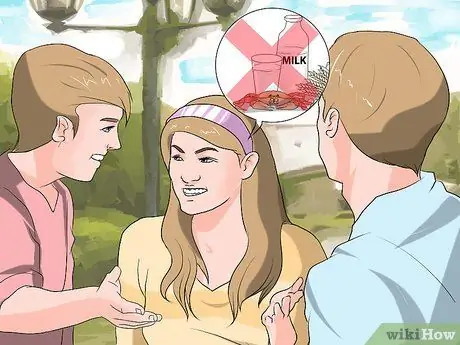
Step 5. Join a support group
Joining a support group or attending an event for allergy sufferers will give you support from those who are also experiencing it. In addition, they may also have ways of dealing with various aspects of allergies.
- There are many support groups that meet online. If meeting physically is too difficult, meeting online might be an option.
- Attend a food allergy event or conference near you. You may get contact and information that helps with your particular allergy from this event. For example, the US-based FARE agency held Food Allergy Awareness Week.
- Find information by watching shows for allergy sufferers. For example, documentaries made by FARE and the Discovery Channel.
- In the US, FARE even provides a service to find food allergy support groups according to your area of residence.

Step 6. Prepare to deal with allergy attacks
You may find it easier to be prepared for an allergic attack from an unexpected source. Tell the person you're allergic to, or take your emergency allergy medicine with you.
- Know the signs of an anaphylactic reaction and how to treat it. Every allergic reaction is different and is determined by your level of sensitivity to the triggering substance and the amount of exposure.
- Ask your doctor to prescribe emergency epinephrine if you are prone to severe allergic reactions.
- Carry an over-the-counter antihistamine if you have a mild allergic reaction. Diphenhydramine (Benadryl) is a very effective drug. However, be aware that the side effects of this medication include extreme drowsiness, dizziness, or confusion.
- Tell the waiter about your allergies.
- Prepare a plan for dealing with allergy attacks and keep it in your bag or purse. Include information on how to treat your condition and who to contact in an emergency.
Tips
Do not hesitate to ask what ingredients are in your dish to the restaurant waiter, event organizer, or friend who serves it. Better to ask than to have an allergic reaction
Warning
- If you have a severe allergic reaction, take epinephrine and seek medical attention immediately.
- If you're having an allergic reaction and are still conscious, try to get people around you to ask for help.






